Critical University
Thumbnail
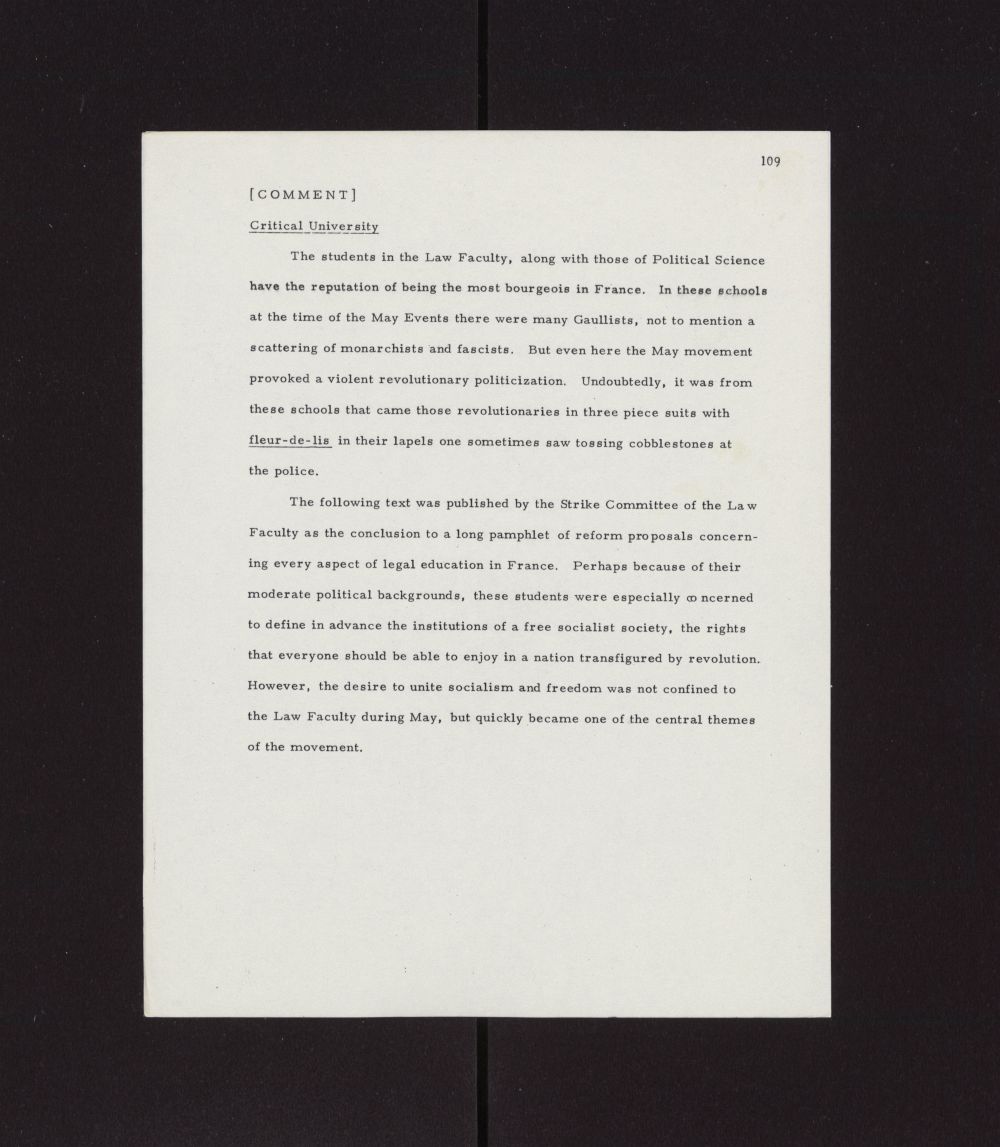

109
[COMMENT]
* v
The students in the Law Faculty, along with those of Political Science
have the reputation of being the most bourgeois in France, In the«e schools
at the time of the May Events there were many Gaullists, not to mention a
scattering of monarchists and fascists. But even here the May movement
provoked a violent revolutionary politicization. Undoubtedly, it was from
these schools that came those revolutionaries in three piece suits with
£zili£. *n their lapels one sometimes saw tossing cobblestones at
have the reputation of being the most bourgeois in France, In the«e schools
at the time of the May Events there were many Gaullists, not to mention a
scattering of monarchists and fascists. But even here the May movement
provoked a violent revolutionary politicization. Undoubtedly, it was from
these schools that came those revolutionaries in three piece suits with
£zili£. *n their lapels one sometimes saw tossing cobblestones at
the police.
The following text was published by the Strike Committee of the Law
Faculty as the conclusion to a long pamphlet of reform proposals concern-
ing every aspect of legal education in France, Perhaps because of their
moderate political backgrounds, these students were especially CD ncerned
to define in advance the institutions of a free socialist society, the rights
that everyone should be able to enjoy in a nation transfigured by revolution.
However, the desire to unite socialism and freedom was not confined to
the Law Faculty during May, but quickly became one of the central themes
of the movement.
Faculty as the conclusion to a long pamphlet of reform proposals concern-
ing every aspect of legal education in France, Perhaps because of their
moderate political backgrounds, these students were especially CD ncerned
to define in advance the institutions of a free socialist society, the rights
that everyone should be able to enjoy in a nation transfigured by revolution.
However, the desire to unite socialism and freedom was not confined to
the Law Faculty during May, but quickly became one of the central themes
of the movement.
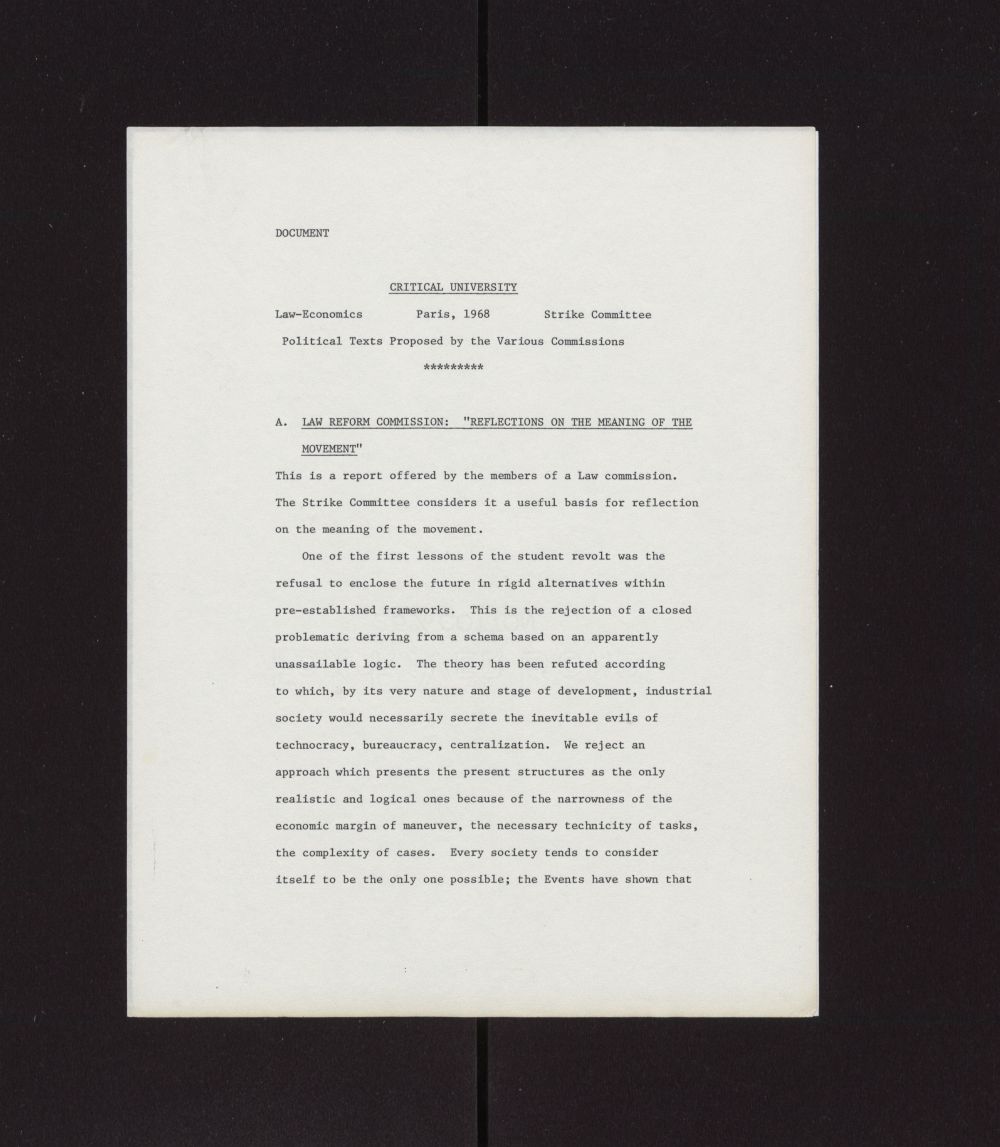

DOCUMENT
Law-Economics Paris, 1968 Strike Committee
Political Texts Proposed by the Various Commissions
Political Texts Proposed by the Various Commissions
*********
A. LAWlEnmM
MOVEMENT"
This is a report offered by the members of a Law commission.
The Strike Committee considers it a useful basis for reflection
on the meaning of the movement.
The Strike Committee considers it a useful basis for reflection
on the meaning of the movement.
One of the first lessons of the student revolt was the
refusal to enclose, the future in rigid alternatives within
pre-established frameworks. This is the rejection of a closed
problematic deriving from a schema based on an apparently
unassailable logic. The theory has been refuted according
to which, by its very nature and stage of development, industrial
society would necessarily secrete the inevitable evils of
technocracy, bureaucracy, centralization. We reject an
approach which presents the present structures as the only
realistic and logical ones because of the narrowness of the
economic margin of maneuver, the necessary technicity of tasks,
the complexity of cases. Every society tends to consider
itself to be the only one possible; the Events have shown, that
refusal to enclose, the future in rigid alternatives within
pre-established frameworks. This is the rejection of a closed
problematic deriving from a schema based on an apparently
unassailable logic. The theory has been refuted according
to which, by its very nature and stage of development, industrial
society would necessarily secrete the inevitable evils of
technocracy, bureaucracy, centralization. We reject an
approach which presents the present structures as the only
realistic and logical ones because of the narrowness of the
economic margin of maneuver, the necessary technicity of tasks,
the complexity of cases. Every society tends to consider
itself to be the only one possible; the Events have shown, that
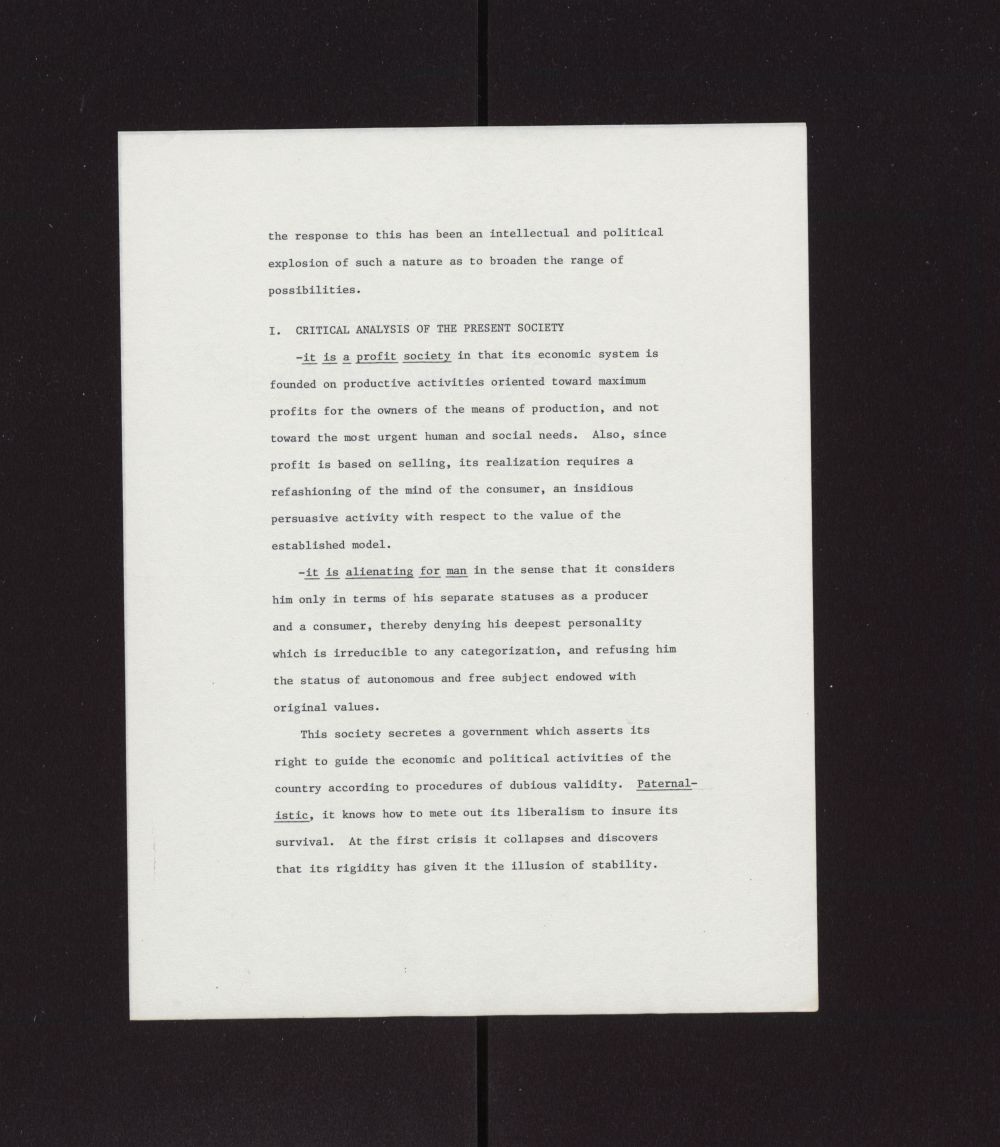

the response to this has been an Intellectual and political
explosion of such a nature as to broaden the range of
possibilities.
explosion of such a nature as to broaden the range of
possibilities.
I. CRITICAL ANALYSIS OF THE SOCIETY
n that its economic system is
founded on productive activities oriented toward maximum
profits for the owners of the means of production, and not
toward the most urgent human and social needs. Also, since
profits for the owners of the means of production, and not
toward the most urgent human and social needs. Also, since
profit is based on selling, its realization requires a
refashioning of the mind of the consumer, an insidious
persuasive activity with respect to the value of the
established model.
refashioning of the mind of the consumer, an insidious
persuasive activity with respect to the value of the
established model.
~Ul i§. alienating Jcrr man in the sense that it considers
him only In terms of his separate statuses as a producer
and a consumer, thereby denying his deepest personality
which is irreducible to any categorization, and refusing him
the status of autonomous and free subject endowed with
original values.
him only In terms of his separate statuses as a producer
and a consumer, thereby denying his deepest personality
which is irreducible to any categorization, and refusing him
the status of autonomous and free subject endowed with
original values.
This society secretes a government which asserts its
right to guide the economic and political activities of the
country according to procedures of dubious validity, Paternal-
_istj;c_, It knows how to mete out Its liberalism to insure Its
survival. At the first crisis It collapses and discovers
that its rigidity has given It the illusion of stability.
right to guide the economic and political activities of the
country according to procedures of dubious validity, Paternal-
_istj;c_, It knows how to mete out Its liberalism to insure Its
survival. At the first crisis It collapses and discovers
that its rigidity has given It the illusion of stability.
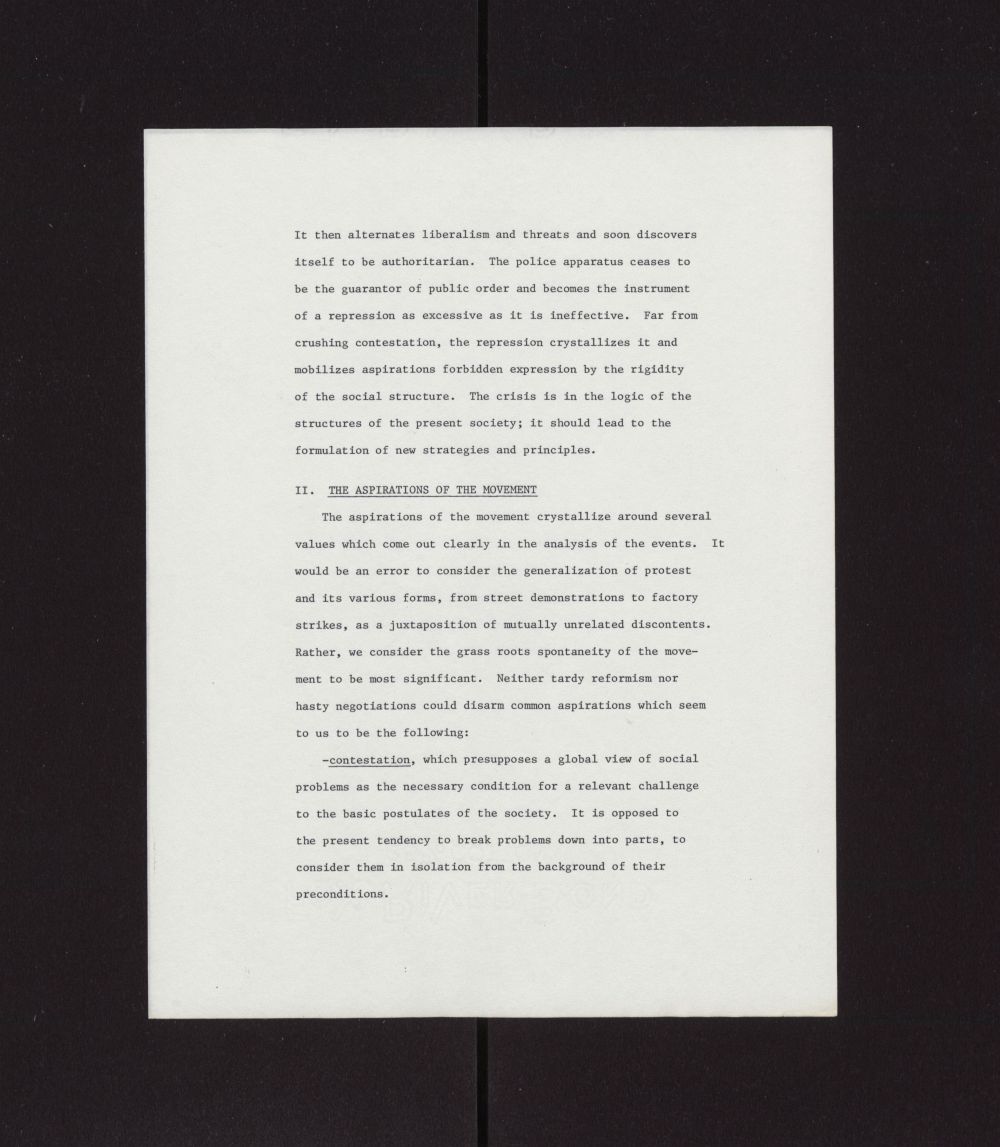

It then alternates liberalism and threats and soon discovers
itself to be authoritarian. The police apparatus ceases to
be the guarantor of public order and becomes the instrument
of a repression as excessive as it is ineffective. Far from
crushing contestation, the repression crystallizes it and
mobilizes aspirations forbidden expression by the rigidity
of the social structure. The crisis is in the logic of the
structures of the present society; it should lead to the
formulation of new strategies and principles.
itself to be authoritarian. The police apparatus ceases to
be the guarantor of public order and becomes the instrument
of a repression as excessive as it is ineffective. Far from
crushing contestation, the repression crystallizes it and
mobilizes aspirations forbidden expression by the rigidity
of the social structure. The crisis is in the logic of the
structures of the present society; it should lead to the
formulation of new strategies and principles.
II. THEISPIMTJOTS)
The aspirations of the movement crystallize around several
values which come out clearly in the analysis of the events. It
would be an error to consider the generalization of protest
and its various forms, from street demonstrations to factory
strikes, as a juxtaposition of mutually unrelated discontents.
Rather, we consider the grass roots spontaneity of the move-
ment to be most significant. Neither tardy reformism nor
hasty negotiations could disarm common aspirations which seem
to us to be the following:
values which come out clearly in the analysis of the events. It
would be an error to consider the generalization of protest
and its various forms, from street demonstrations to factory
strikes, as a juxtaposition of mutually unrelated discontents.
Rather, we consider the grass roots spontaneity of the move-
ment to be most significant. Neither tardy reformism nor
hasty negotiations could disarm common aspirations which seem
to us to be the following:
—contestation, which presupposes a global view of social
problems as the necessary condition for a relevant challenge
to the basic postulates of the society. It is opposed to
the present tendency to break problems down into parts, to
consider them in isolation from the background of their
precondit ions .
problems as the necessary condition for a relevant challenge
to the basic postulates of the society. It is opposed to
the present tendency to break problems down into parts, to
consider them in isolation from the background of their
precondit ions .
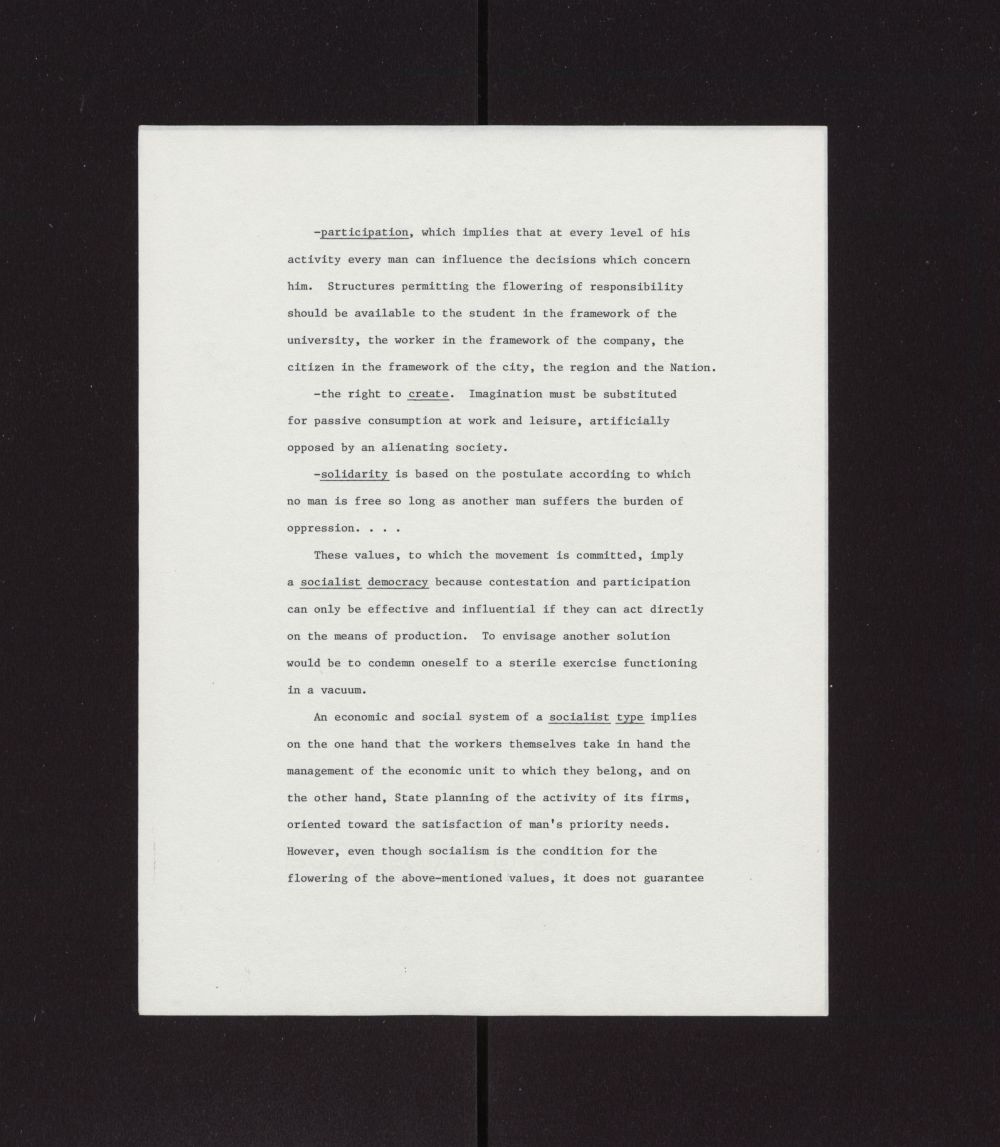

-j)art:J:£iga.tion, which implies that at every level of his
activity every man can influence the decisions which concern
him. Structures permitting the flowering of responsibility
should be available to the student in the framework of the
university, the worker in the framework of the company, the
citizen in the framework of the city, the region and the Nation.
activity every man can influence the decisions which concern
him. Structures permitting the flowering of responsibility
should be available to the student in the framework of the
university, the worker in the framework of the company, the
citizen in the framework of the city, the region and the Nation.
-the right to create^. Imagination must be substituted
for passive consumption at work and leisure, artificially
opposed by an alienating society.
for passive consumption at work and leisure, artificially
opposed by an alienating society.
^-s based on the postulate according to which
no man is free so long as another man suffers the burden of
oppression. . . .
oppression. . . .
These values, to which the movement is committed, imply
a 55£i§iiSt ^®HS££9£Z. because contestation and participation
can only be effective and influential if they can act directly
on the means of production. To envisage another solution
would be to condemn oneself to a sterile exercise functioning
in a vacuum.
a 55£i§iiSt ^®HS££9£Z. because contestation and participation
can only be effective and influential if they can act directly
on the means of production. To envisage another solution
would be to condemn oneself to a sterile exercise functioning
in a vacuum.
An economic and social system of a _socjLalist:_ _tyj>e_ implies
on the one hand that the workers themselves take in hand the
management of the economic unit to which they belong, and on
the other hand, State planning of the activity of its firms,
oriented toward the satisfaction of man's priority needs.
However, even though socialism is the condition for the
flowering of the above-mentioned values, it does not guarantee
on the one hand that the workers themselves take in hand the
management of the economic unit to which they belong, and on
the other hand, State planning of the activity of its firms,
oriented toward the satisfaction of man's priority needs.
However, even though socialism is the condition for the
flowering of the above-mentioned values, it does not guarantee
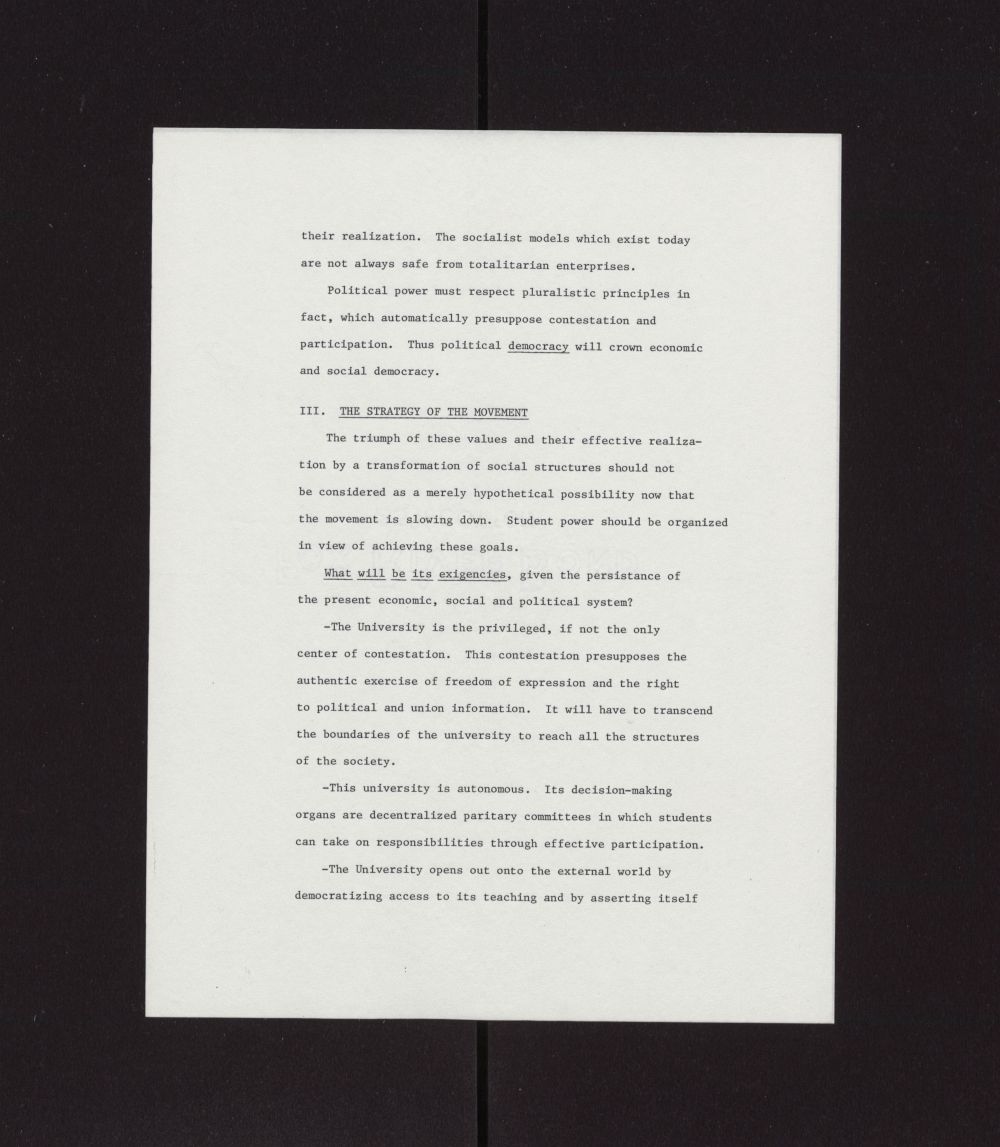

their realization. The socialist models which exist today
are not always safe from totalitarian enterprises.
are not always safe from totalitarian enterprises.
Political power must respect pluralistic principles in
fact, which automatically presuppose contestation and
participation. Thus political democracy, will crown economic
and social democracy.
fact, which automatically presuppose contestation and
participation. Thus political democracy, will crown economic
and social democracy.
III. THEOTATG
The triumph of these values and their effective realiza-
tion by a transformation of social structures should not
tion by a transformation of social structures should not
be considered as a merely hypothetical possibility now that
the movement is slowing down. Student power should be organized
in view of achieving these goals.
WhfLt. will be_ _it_s_ exigencies, given the persistance of
the present economic, social and political system?
the present economic, social and political system?
-The University is the privileged, if not the only
center of contestation. This contestation presupposes the
authentic exercise of freedom of expression and the right
to political and union information. It will have to transcend
the boundaries of the university to reach all the structures
of the society.
center of contestation. This contestation presupposes the
authentic exercise of freedom of expression and the right
to political and union information. It will have to transcend
the boundaries of the university to reach all the structures
of the society.
-This university is autonomous. Its decision-making
organs are decentralized paritary committees in which students
can take on responsibilities through effective participation.
organs are decentralized paritary committees in which students
can take on responsibilities through effective participation.
-The University opens out onto the external world by
democratizing access to its teaching and by asserting Itself
democratizing access to its teaching and by asserting Itself
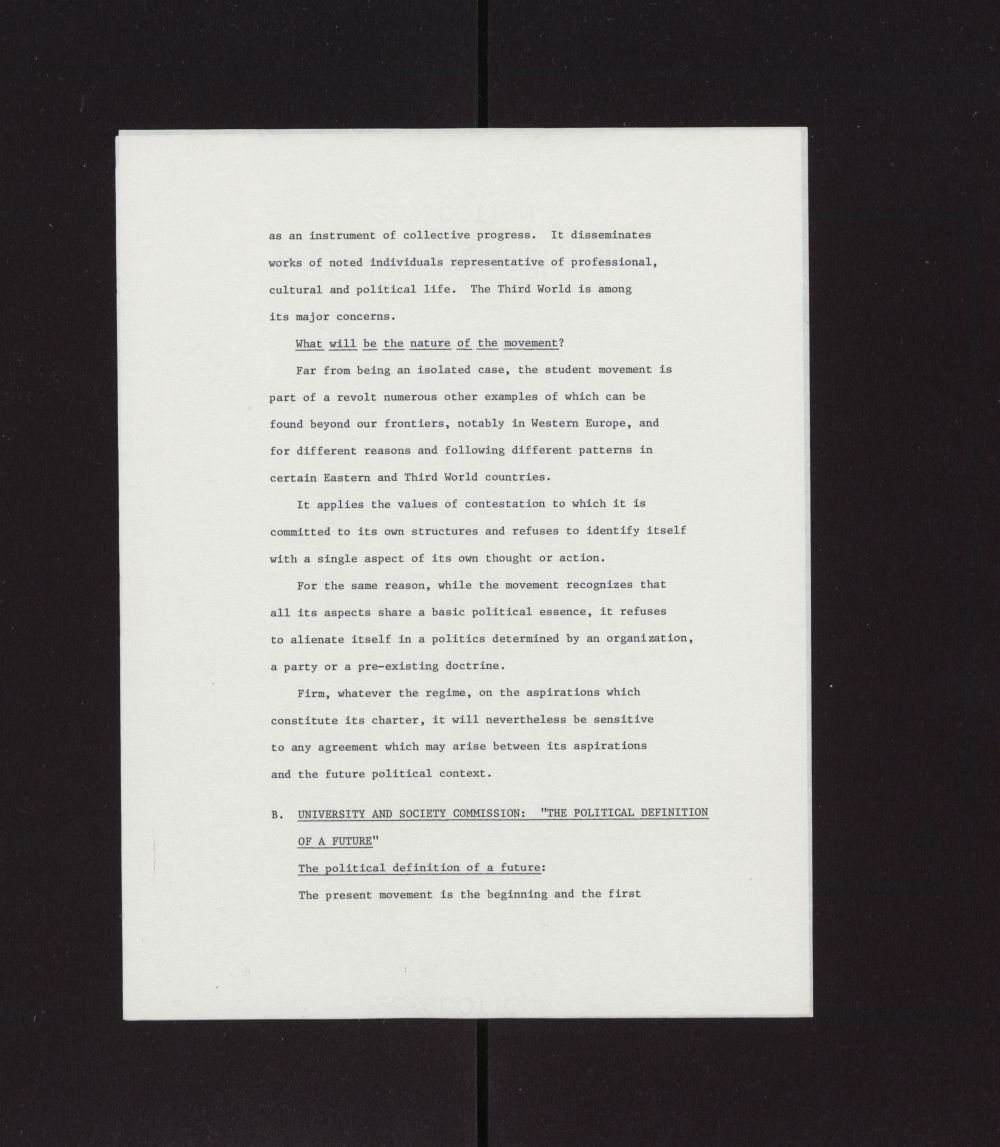

as an Instrument of collective progress. It disseminates
works of noted individuals representative of professional,
cultural and political life. The Third World Is among
Its major concerns.
works of noted individuals representative of professional,
cultural and political life. The Third World Is among
Its major concerns.
Far from being an Isolated case, the student movement Is
part of a revolt numerous other examples of which can be
found beyond our frontiers, notably In Western Europe, and
for different reasons and following different patterns In
certain Eastern and Third World countries.
part of a revolt numerous other examples of which can be
found beyond our frontiers, notably In Western Europe, and
for different reasons and following different patterns In
certain Eastern and Third World countries.
It applies the values of contestation to which It Is
committed to its own structures and refuses to identify itself
with a single aspect of Its own thought or action.
committed to its own structures and refuses to identify itself
with a single aspect of Its own thought or action.
For the same reason, while the movement recognizes that
all its aspects share a basic political essence, It refuses
to alienate itself In a politics determined by an organization,
a party or a pre-existing doctrine.
all its aspects share a basic political essence, It refuses
to alienate itself In a politics determined by an organization,
a party or a pre-existing doctrine.
Firm, whatever the regime, on the aspirations which
constitute Its charter, it will nevertheless be sensitive
to any agreement which may arise, between Its aspirations
and the future political context.
constitute Its charter, it will nevertheless be sensitive
to any agreement which may arise, between Its aspirations
and the future political context.
B.
The political def jLnitj.on of ........... a jcuture:
The present, movement is the beginning and the first
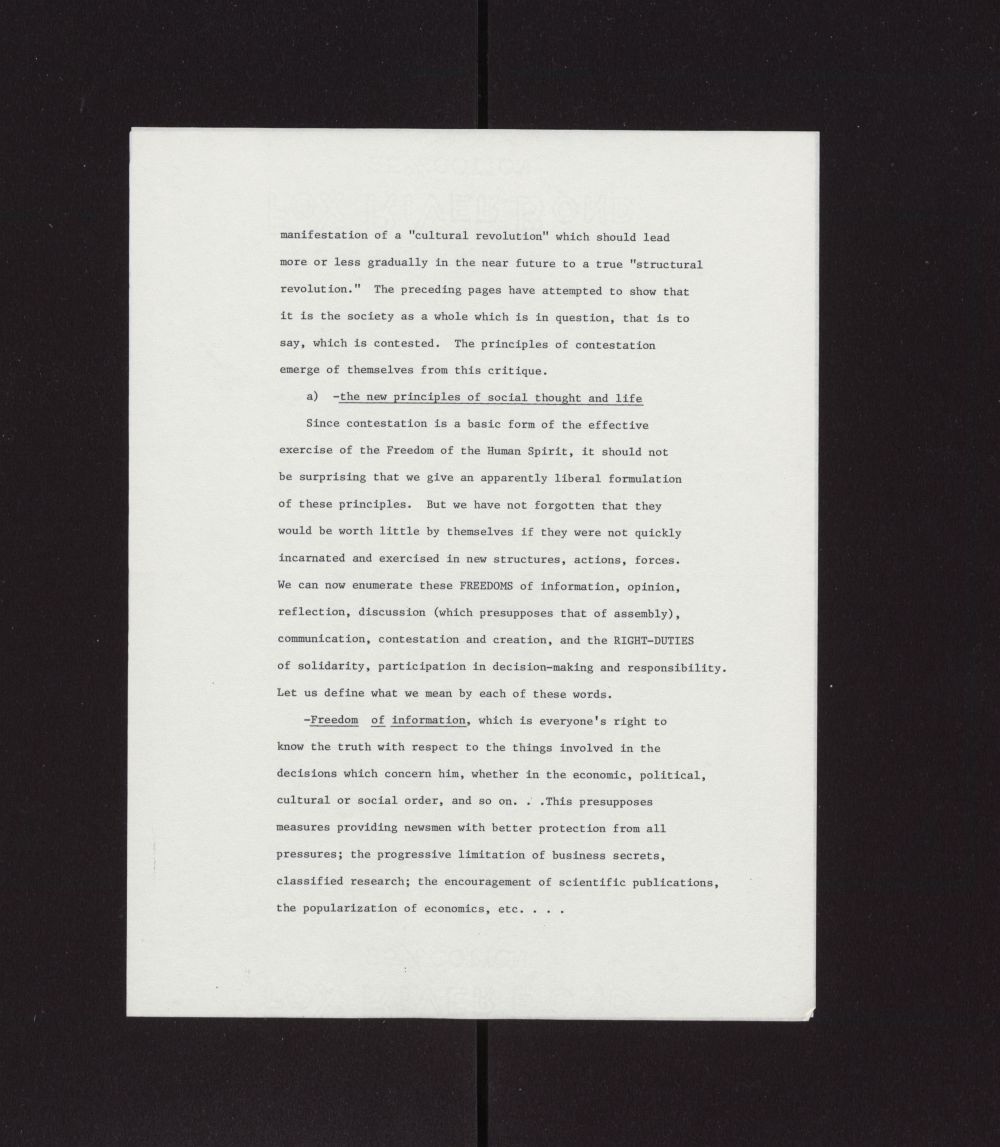

manifestation of a "cultural revolution" which should lead
more or less gradually in the near future to a true "structural
revolution." The preceding pages have attempted to show that
it is the society as a whole which is In question, that is to
more or less gradually in the near future to a true "structural
revolution." The preceding pages have attempted to show that
it is the society as a whole which is In question, that is to
say, which is contested. The principles of contestation
emerge of themselves from this critique.
a) "JilMLJl^H-JJE^LEiyii^^
a) "JilMLJl^H-JJE^LEiyii^^
Since contestation is a basic form of the effective
exercise of the Freedom of the Human Spirit, It should not
be surprising that we give an apparently liberal formulation
of these principles. But we have not forgotten that they
would be worth little by themselves if they were not quickly
Incarnated and exercised in new structures, actions, forces.
We can now enumerate these FREEDOMS of information, opinion,
reflection, discussion (which presupposes that of assembly) ,
communication, contestation and creation, and the RIGHT-DUTIES
of solidarity, participation in decision-making and responsibility.
Let us define what we mean by each of these words.
exercise of the Freedom of the Human Spirit, It should not
be surprising that we give an apparently liberal formulation
of these principles. But we have not forgotten that they
would be worth little by themselves if they were not quickly
Incarnated and exercised in new structures, actions, forces.
We can now enumerate these FREEDOMS of information, opinion,
reflection, discussion (which presupposes that of assembly) ,
communication, contestation and creation, and the RIGHT-DUTIES
of solidarity, participation in decision-making and responsibility.
Let us define what we mean by each of these words.
-Fre_edom of information, which is everyone's right to
know the truth with respect to the things Involved in the
decisions which concern him, whether in the economic, political,
cultural or social order, and so on. .' .This presupposes
measures providing newsmen with better protection from all
pressures; the progressive limitation of business secrets,
classified research; the encouragement of scientific publications,
the popularization of economics, etc. . . .
know the truth with respect to the things Involved in the
decisions which concern him, whether in the economic, political,
cultural or social order, and so on. .' .This presupposes
measures providing newsmen with better protection from all
pressures; the progressive limitation of business secrets,
classified research; the encouragement of scientific publications,
the popularization of economics, etc. . . .
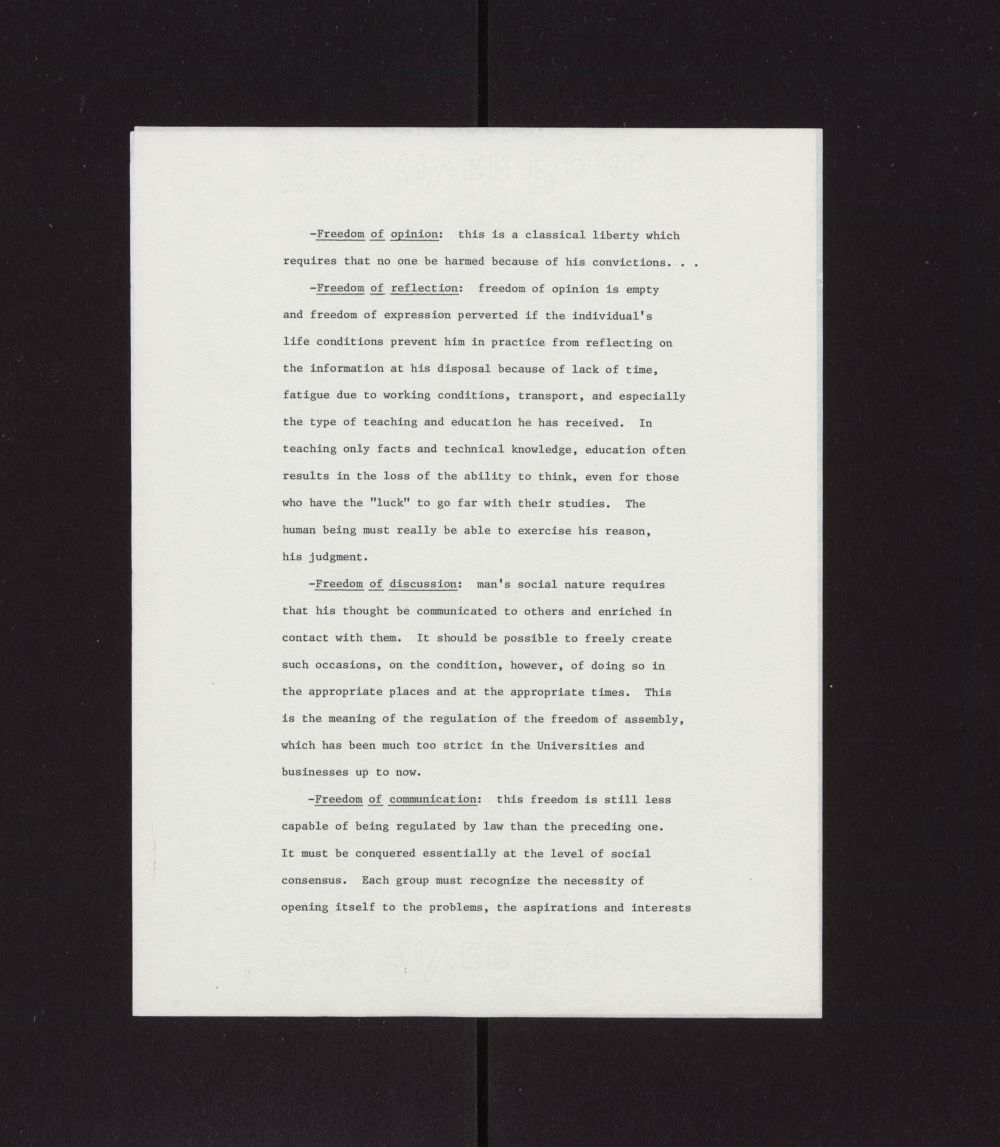

-Freedom _of o£inion_: this is a classical liberty which
requires that no one be harmed because of his convictions, . .
requires that no one be harmed because of his convictions, . .
~I_E£S^2I5 °JL -ESJl*5iti2!l: freedom of opinion is empty
and freedom of expression perverted if the Individual's
life conditions prevent him In practice from reflecting on
the Information at his disposal because of lack of time,
fatigue due to working conditions, transport, and especially
the type of teaching and education he has received. In
teaching only facts and technical knowledge, education often
results in the loss of the ability to think, even for those
who have the "luck" to go far with their studies. The
human being must really be able to exercise his reason,
his judgment.
and freedom of expression perverted if the Individual's
life conditions prevent him In practice from reflecting on
the Information at his disposal because of lack of time,
fatigue due to working conditions, transport, and especially
the type of teaching and education he has received. In
teaching only facts and technical knowledge, education often
results in the loss of the ability to think, even for those
who have the "luck" to go far with their studies. The
human being must really be able to exercise his reason,
his judgment.
-Freedom of discussion: man's social nature requires
that his thought be communicated to others and enriched In
contact with them. It should be possible to freely create
such occasions, on the condition, however, of doing so In
the appropriate places and at the appropriate times. This
is the meaning of the regulation of the freedom of assembly,
which has been much too strict In the Universities and
businesses up to now.
that his thought be communicated to others and enriched In
contact with them. It should be possible to freely create
such occasions, on the condition, however, of doing so In
the appropriate places and at the appropriate times. This
is the meaning of the regulation of the freedom of assembly,
which has been much too strict In the Universities and
businesses up to now.
-Freedom _of_ _comjrajnlcation: this freedom Is still less
capable of being regulated by law than the preceding one.
It must be conquered essentially at the level of social
consensus. Each group must recognize the necessity of
opening Itself to the problems, the aspirations and interests
capable of being regulated by law than the preceding one.
It must be conquered essentially at the level of social
consensus. Each group must recognize the necessity of
opening Itself to the problems, the aspirations and interests
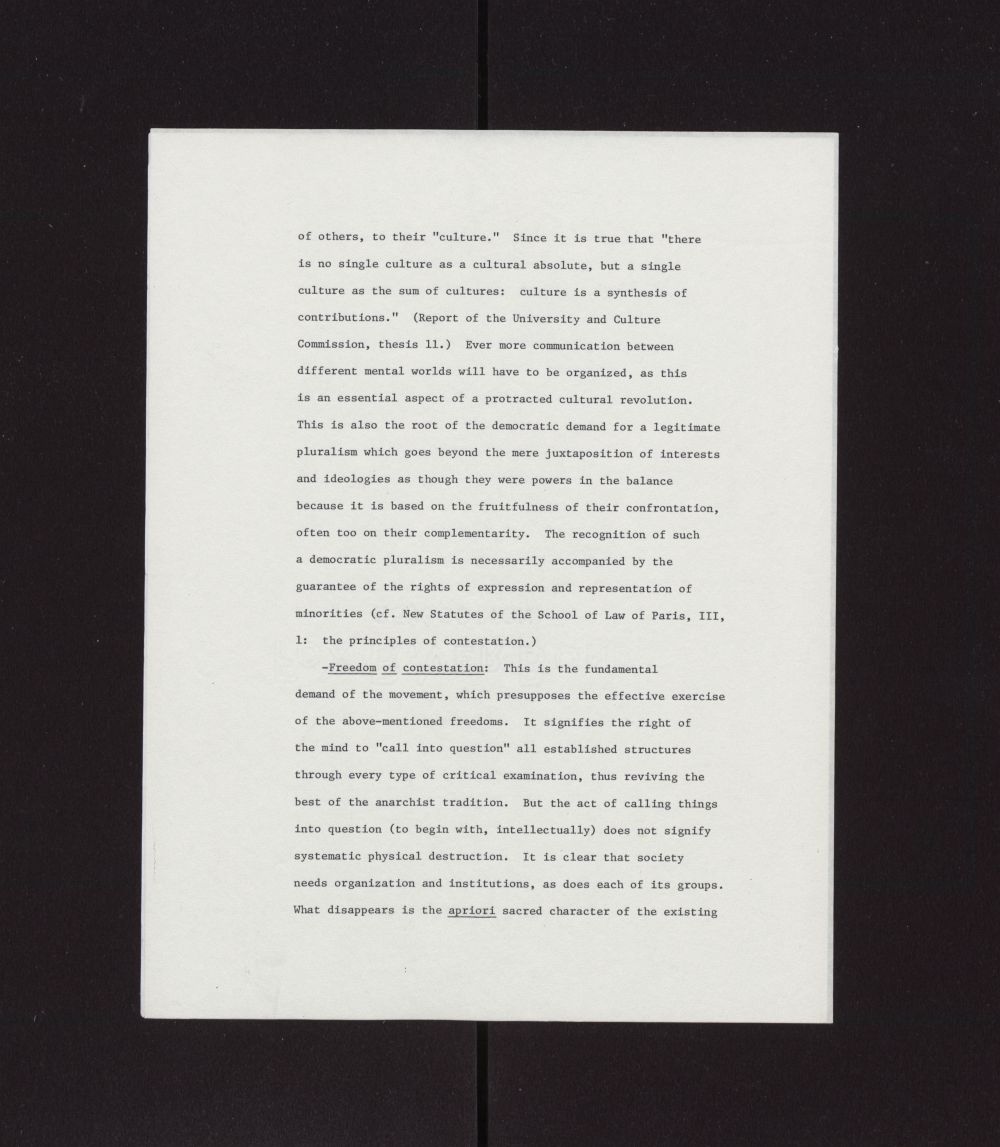

of others, to their "culture." Since it is true that "there
Is no single culture as a cultural absolute, but a single
culture as the sum of cultures: culture is a synthesis of
contributions." (Report of the University and Culture
Commission, thesis 11.) Ever more communication between
different mental worlds will have to be organized, as this
Is an essential aspect of a protracted cultural revolution,
This is also the root of the democratic demand for a legitimate
pluralism which goes beyond the mere juxtaposition of interests
and Ideologies as though they were powers In the balance
because it is based on the fruitfulness of their confrontation,
often too on their complementarity. The recognition of such
a democratic pluralism is necessarily accompanied by the
guarantee of the rights of expression and representation of
minorities (cf. New Statutes of the School of Law of Paris, III,
1: the principles of contestation.)
Is no single culture as a cultural absolute, but a single
culture as the sum of cultures: culture is a synthesis of
contributions." (Report of the University and Culture
Commission, thesis 11.) Ever more communication between
different mental worlds will have to be organized, as this
Is an essential aspect of a protracted cultural revolution,
This is also the root of the democratic demand for a legitimate
pluralism which goes beyond the mere juxtaposition of interests
and Ideologies as though they were powers In the balance
because it is based on the fruitfulness of their confrontation,
often too on their complementarity. The recognition of such
a democratic pluralism is necessarily accompanied by the
guarantee of the rights of expression and representation of
minorities (cf. New Statutes of the School of Law of Paris, III,
1: the principles of contestation.)
c o n t e s t a ti on : This Is the fundamental
demand of the movement, which presupposes the effective exercise
of the above-mentioned freedoms. It signifies the right of
the mind to "call Into question" all established structures
through every type of critical examination, thus reviving the
of the above-mentioned freedoms. It signifies the right of
the mind to "call Into question" all established structures
through every type of critical examination, thus reviving the
best of the anarchist tradition. But the act of calling things
Into question (to begin with, intellectually) does not signify
systematic physical destruction. It is clear that society
Into question (to begin with, intellectually) does not signify
systematic physical destruction. It is clear that society
needs organization and institutions, as does each of Its groups.
What disappears is the 3^riori_ sacred character of the existing
What disappears is the 3^riori_ sacred character of the existing
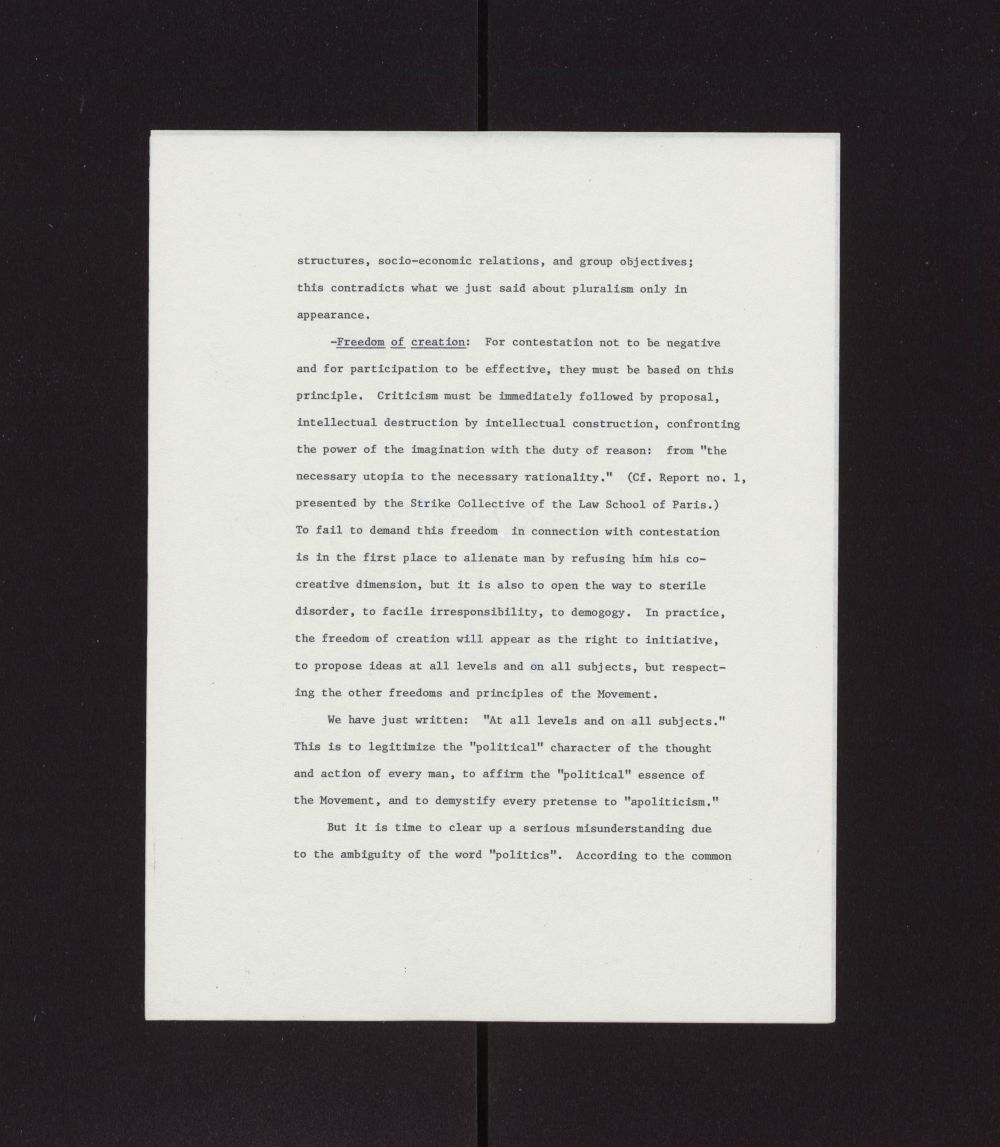

structures, socio-economic relations, and group objectives;
this contradicts what we Just said about pluralism only in
appearance,
this contradicts what we Just said about pluralism only in
appearance,
-Freedom of_ creation: For contestation not to be negative
and for participation to be effective, they must be based on this
principle. Criticism must be immediately followed by proposal,
intellectual destruction by intellectual construction, confronting
the power of the imagination with the duty of reason: from "the
necessary Utopia to the necessary rationality," (Cf, Report no. 1,
presented by the Strike Collective of the Law School of Paris.)
To fail to demand this freedom in connection with contestation
is in the first place to alienate man by refusing him his co-
creative dimension, but it is also to open the way to sterile
disorder, to facile irresponsibility, to demogogy. In practice,
the freedom of creation will appear as the right to initiative,
to propose ideas at all levels and on all subjects, but respect-
ing the other freedoms and principles of the Movement.
and for participation to be effective, they must be based on this
principle. Criticism must be immediately followed by proposal,
intellectual destruction by intellectual construction, confronting
the power of the imagination with the duty of reason: from "the
necessary Utopia to the necessary rationality," (Cf, Report no. 1,
presented by the Strike Collective of the Law School of Paris.)
To fail to demand this freedom in connection with contestation
is in the first place to alienate man by refusing him his co-
creative dimension, but it is also to open the way to sterile
disorder, to facile irresponsibility, to demogogy. In practice,
the freedom of creation will appear as the right to initiative,
to propose ideas at all levels and on all subjects, but respect-
ing the other freedoms and principles of the Movement.
We have Just written; "At all levels and on all subjects."
This is to legitimize the "political" character of the thought
and action of every man, to affirm the "political" essence of
the Movement, and to demystify every pretense to "apoliticism,"
This is to legitimize the "political" character of the thought
and action of every man, to affirm the "political" essence of
the Movement, and to demystify every pretense to "apoliticism,"
But it is time to clear up a serious misunderstanding due
to the ambiguity of the word "politics". According to the common
to the ambiguity of the word "politics". According to the common
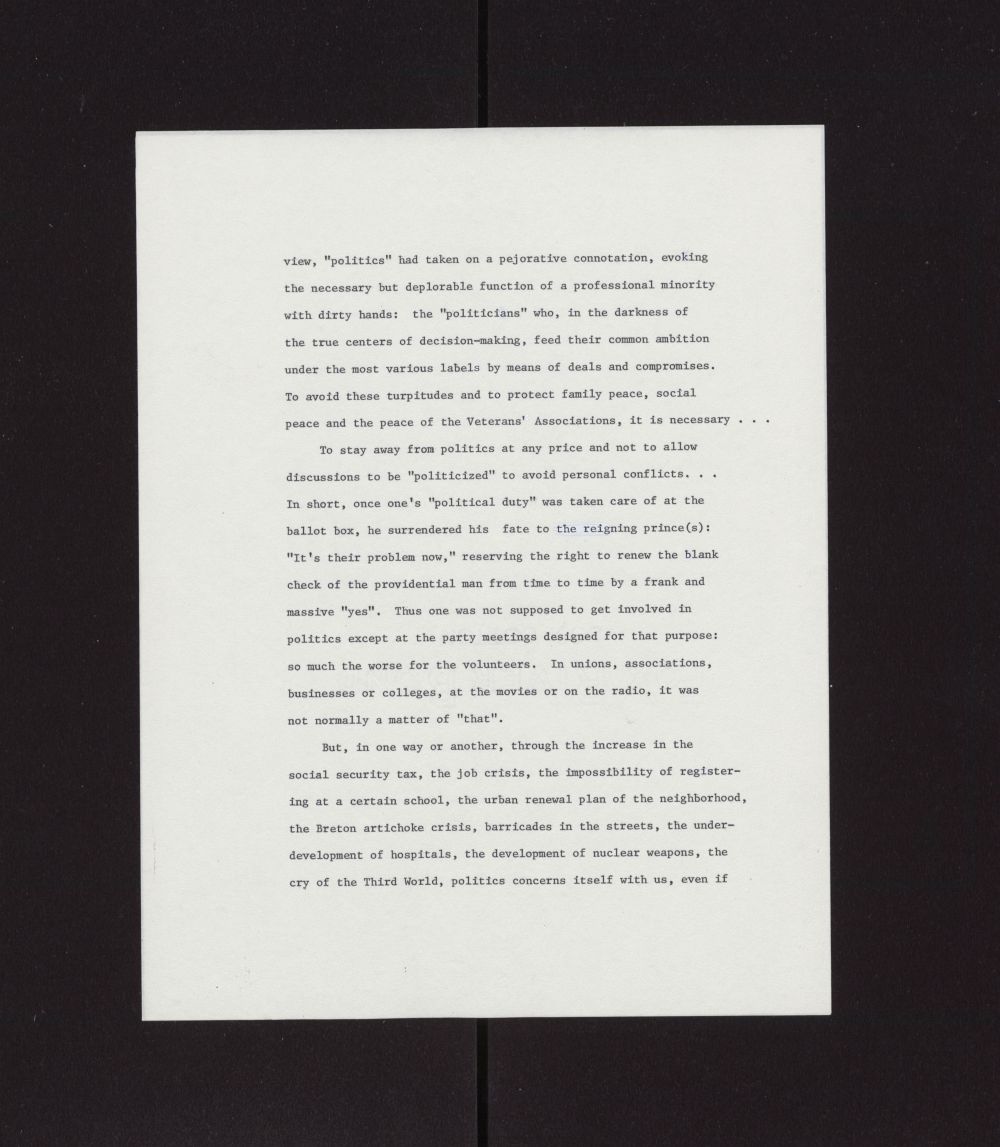

view, "politics" tad taken on a pejorative connotation, evoking
the. necessary but deplorable function of a professional minority
with dirty hands: the "politicians" who, in the darkness of
the true centers of decision-making, feed their common ambition
under the most various labels by means of deals and compromises.
To avoid these turpitudes and to protect family peace, social
peace and the peace of the Veterans' Associations, it is necessary . . ,
To stay away from politics at any price and not to allow
discussions to be "politicized" to avoid personal conflicts. , ,
In short, once one's "political duty" was taken care of at the
ballot box, he surrendered his fate to the reigning prince(s);
"It's their problem now," reserving the right to renew the blank
check of the providential man from time to time by a frank and
massive "yes". Thus one was not supposed to get involved in
politics except at the party meetings designed for that purpose;
so much the worse for the volunteers. In unions, associations,
businesses or colleges, at the movies or on the radio, it was
not normally a matter of "that".
discussions to be "politicized" to avoid personal conflicts. , ,
In short, once one's "political duty" was taken care of at the
ballot box, he surrendered his fate to the reigning prince(s);
"It's their problem now," reserving the right to renew the blank
check of the providential man from time to time by a frank and
massive "yes". Thus one was not supposed to get involved in
politics except at the party meetings designed for that purpose;
so much the worse for the volunteers. In unions, associations,
businesses or colleges, at the movies or on the radio, it was
not normally a matter of "that".
But, in one way or another, through the increase in the
social security tax, the job crisis, the Impossibility of register-
ing at a certain school, the urban renewal plan of the neighborhood,
the Breton artichoke crisis, barricades in the streets, the under-
developnient of hospitals, the development of nuclear weapons, the
cry of the Third World, politics concerns itself with us, even if
social security tax, the job crisis, the Impossibility of register-
ing at a certain school, the urban renewal plan of the neighborhood,
the Breton artichoke crisis, barricades in the streets, the under-
developnient of hospitals, the development of nuclear weapons, the
cry of the Third World, politics concerns itself with us, even if
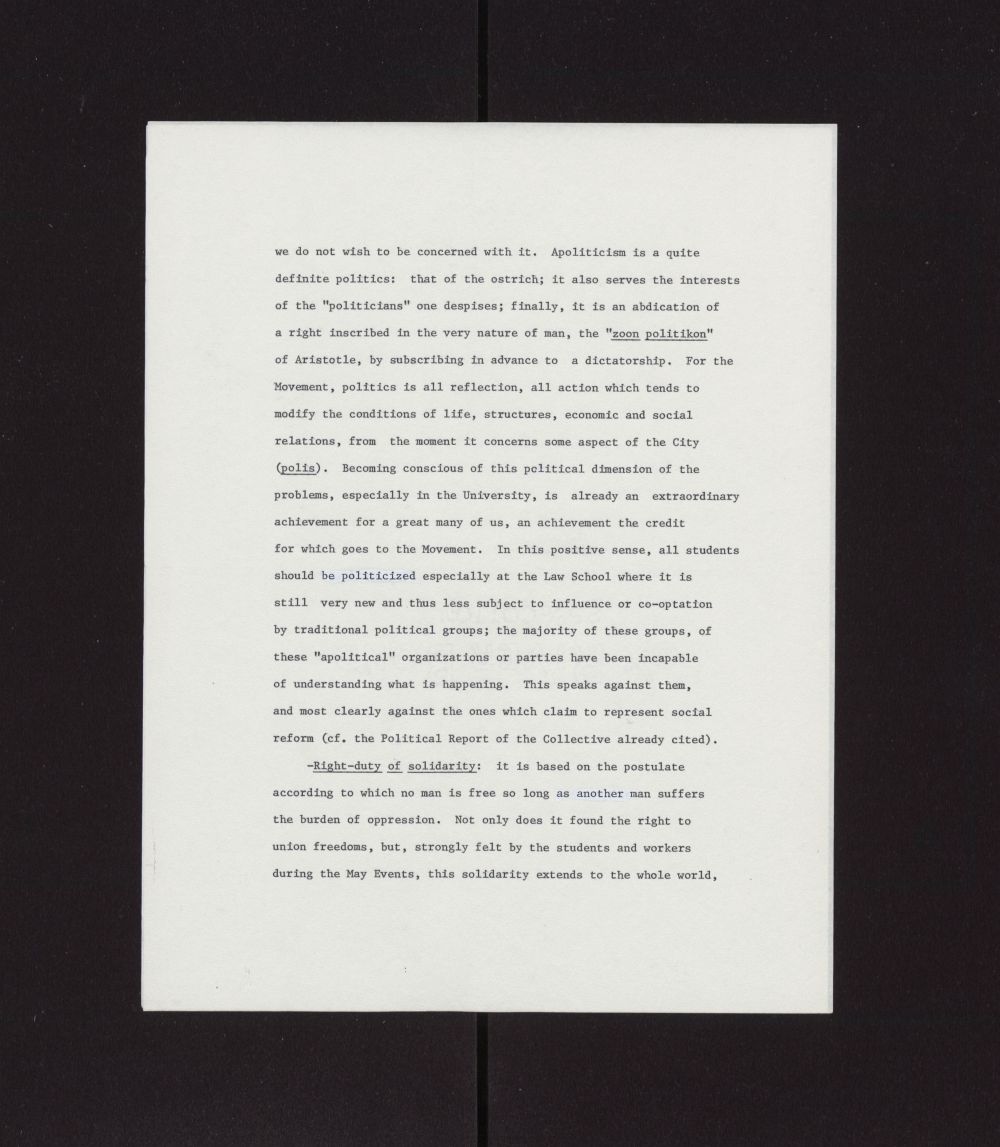

we do not wish to be concerned with It. Apoliticism is a quite
definite politics; that of the ostrich; it also serves the interests
of the "politicians" one despises; finally, it is an abdication of
a right inscribed in the very nature of man, the "goon politikon"
of Aristotle, by subscribing in advance to a dictatorship. For the
Movement, politics is all reflection, all action which tends to
modify the conditions of life, structures, economic and social
relations, from the moment it concerns aspect of the City
(polisj . Becoming conscious of this political dimension of the
problems, especially in the University, is already an extraordinary
achievement for a great many of us , an achievement the credit
for which goes to the Movement. In this positive sense, all students
should be politicized especially at the Law School where it is
still very new and thus less subject to influence or co— optation
by traditional political groups; the majority of these groups, of
these "apolitical" organizations or parties have been incapable
of understanding what is happening. This speaks against them,
and most clearly against the ones which claim to represent social
reform (cf, the Political Report of the Collective already cited).
£JL _solidar ity ; it is based on the postulate
definite politics; that of the ostrich; it also serves the interests
of the "politicians" one despises; finally, it is an abdication of
a right inscribed in the very nature of man, the "goon politikon"
of Aristotle, by subscribing in advance to a dictatorship. For the
Movement, politics is all reflection, all action which tends to
modify the conditions of life, structures, economic and social
relations, from the moment it concerns aspect of the City
(polisj . Becoming conscious of this political dimension of the
problems, especially in the University, is already an extraordinary
achievement for a great many of us , an achievement the credit
for which goes to the Movement. In this positive sense, all students
should be politicized especially at the Law School where it is
still very new and thus less subject to influence or co— optation
by traditional political groups; the majority of these groups, of
these "apolitical" organizations or parties have been incapable
of understanding what is happening. This speaks against them,
and most clearly against the ones which claim to represent social
reform (cf, the Political Report of the Collective already cited).
£JL _solidar ity ; it is based on the postulate
according to which no man is free so long as another man suffers
the burden of oppression. Not only does it found the right to
union freedoms , but , strongly felt by the students and workers
during the May Events, this solidarity extends to the whole world,
the burden of oppression. Not only does it found the right to
union freedoms , but , strongly felt by the students and workers
during the May Events, this solidarity extends to the whole world,
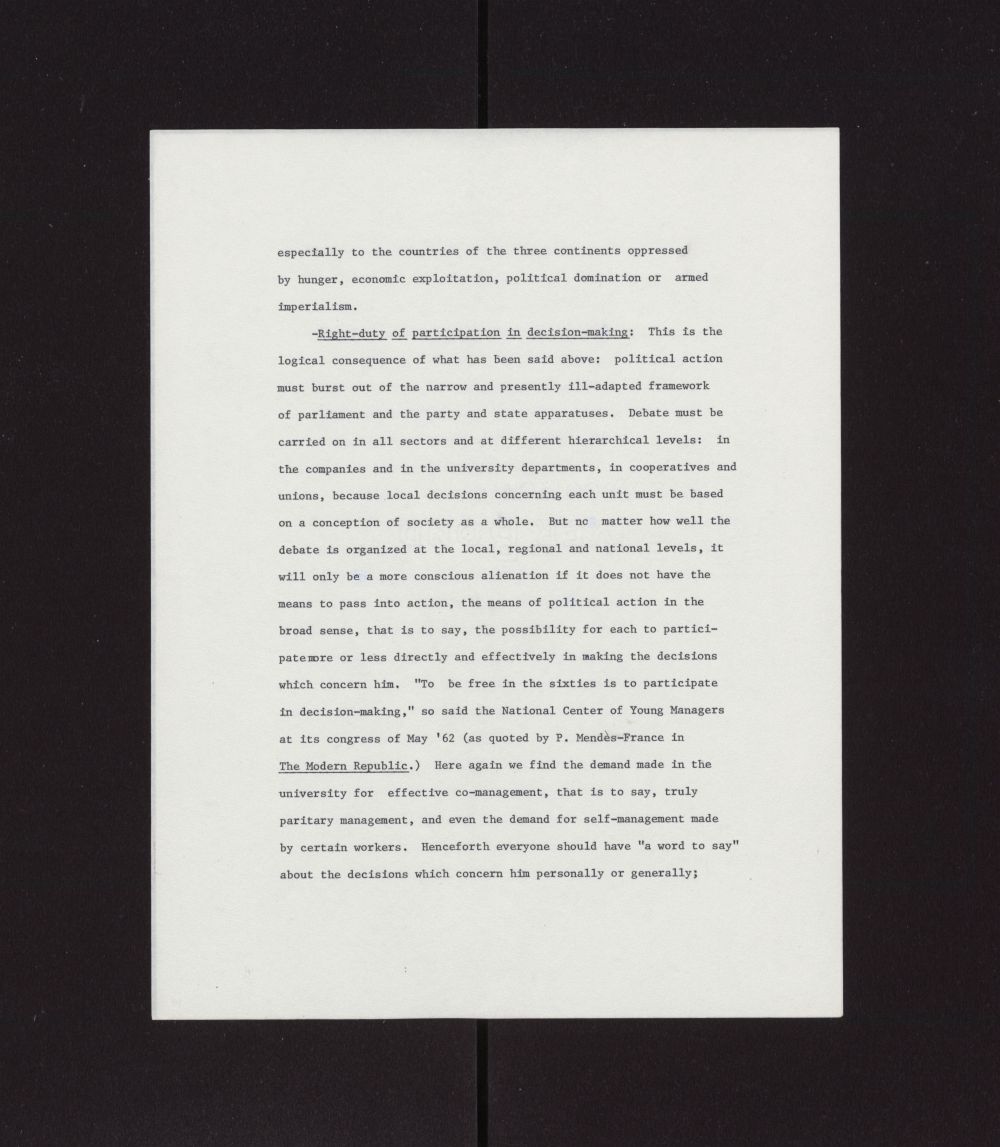

especially to the countries of the three continents oppressed
by hunger, economic exploitation, political domination or armed
imperialism,
by hunger, economic exploitation, political domination or armed
imperialism,
-Rightj-_dtity of_ p_artitcip_ajt:ion _in j£ci^ion-2§Mjig_: This is the
logical consequence of what been said above: political action
must burst out of the narrow and presently ill-adapted framework
of parliament and the party and state apparatuses . Debate must be
carried on in all sectors and at different hierarchical levels: in
the companies and in the university departments, in cooperatives and
unions, because local decisions concerning each unit must be based
on a conception of society as a whole. But nc matter how well the
debate is organized at the local, regional and national levels, it
will only be a more conscious alienation if it doe,s not have the
must burst out of the narrow and presently ill-adapted framework
of parliament and the party and state apparatuses . Debate must be
carried on in all sectors and at different hierarchical levels: in
the companies and in the university departments, in cooperatives and
unions, because local decisions concerning each unit must be based
on a conception of society as a whole. But nc matter how well the
debate is organized at the local, regional and national levels, it
will only be a more conscious alienation if it doe,s not have the
to into action, the means of political action in the
broad sense, that is to say, the possibility for each to partici-
patenore or less directly and effectively in making the decisions
which concern him, "To be free in the sixties is to participate
in decision-making," so said the National Center of Young Managers
at its congress of May *62 (as quoted by P. Mendes— France in
The Modern Republic .) Here again we find the demand made in the
university for effective co -management, that is to say, truly
paritary management , and even the demand for self —management made
by certain workers . Henceforth everyone should have "a word to say"
about the decisions which concern him personally or generally ;
broad sense, that is to say, the possibility for each to partici-
patenore or less directly and effectively in making the decisions
which concern him, "To be free in the sixties is to participate
in decision-making," so said the National Center of Young Managers
at its congress of May *62 (as quoted by P. Mendes— France in
The Modern Republic .) Here again we find the demand made in the
university for effective co -management, that is to say, truly
paritary management , and even the demand for self —management made
by certain workers . Henceforth everyone should have "a word to say"
about the decisions which concern him personally or generally ;
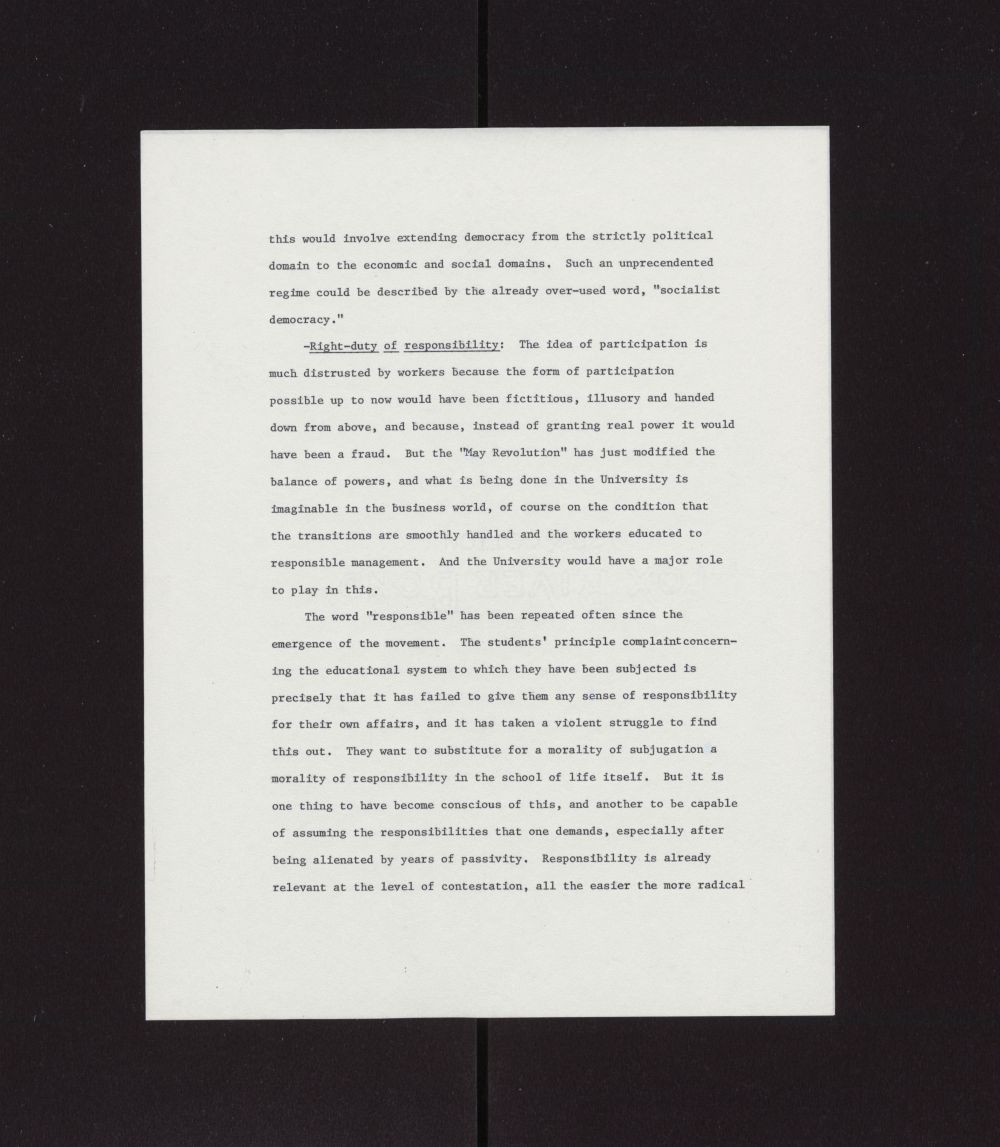

this would involve extending democracy from the strictly political
domain to the economic and social domains. Such an unprecendented
domain to the economic and social domains. Such an unprecendented
regime could be described by the already over-used word, "socialist
democracy."
democracy."
-Rij|ht^djitj_ of res£onsibilitj_; The idea of participation is
much distrusted by workers because the form of participation
possible up to now would have been fictitious, illusory and handed
down from above, and because, instead of granting real power it would
have been a fraud. But the "May Revolution" has just modified the
balance of powers, and what is being done in the University is
imaginable in the business world, of course on the condition that
the transitions are smoothly handled and the workers educated to
responsible management. And the University would have a major role
to play in this.
much distrusted by workers because the form of participation
possible up to now would have been fictitious, illusory and handed
down from above, and because, instead of granting real power it would
have been a fraud. But the "May Revolution" has just modified the
balance of powers, and what is being done in the University is
imaginable in the business world, of course on the condition that
the transitions are smoothly handled and the workers educated to
responsible management. And the University would have a major role
to play in this.
The word "responsible" has been repeated often since the
emergence of the movement. The students' principle complaintconcern-
ing the educational system to which they have heen subjected is
precisely that it has failed to give them any sense of responsibility
for their own affairs, and it has taken a violent struggle to find
this out. They want to substitute for a morality of subjugation a
morality of responsibility in the school of life itself. But it is
one thing to have become conscious of this, and another to be capable
of assuming the responsibilities that one demands, especially after
being alienated by years of passivity. Responsibility is already
relevant at the level of contestation, all the easier the more radical
emergence of the movement. The students' principle complaintconcern-
ing the educational system to which they have heen subjected is
precisely that it has failed to give them any sense of responsibility
for their own affairs, and it has taken a violent struggle to find
this out. They want to substitute for a morality of subjugation a
morality of responsibility in the school of life itself. But it is
one thing to have become conscious of this, and another to be capable
of assuming the responsibilities that one demands, especially after
being alienated by years of passivity. Responsibility is already
relevant at the level of contestation, all the easier the more radical
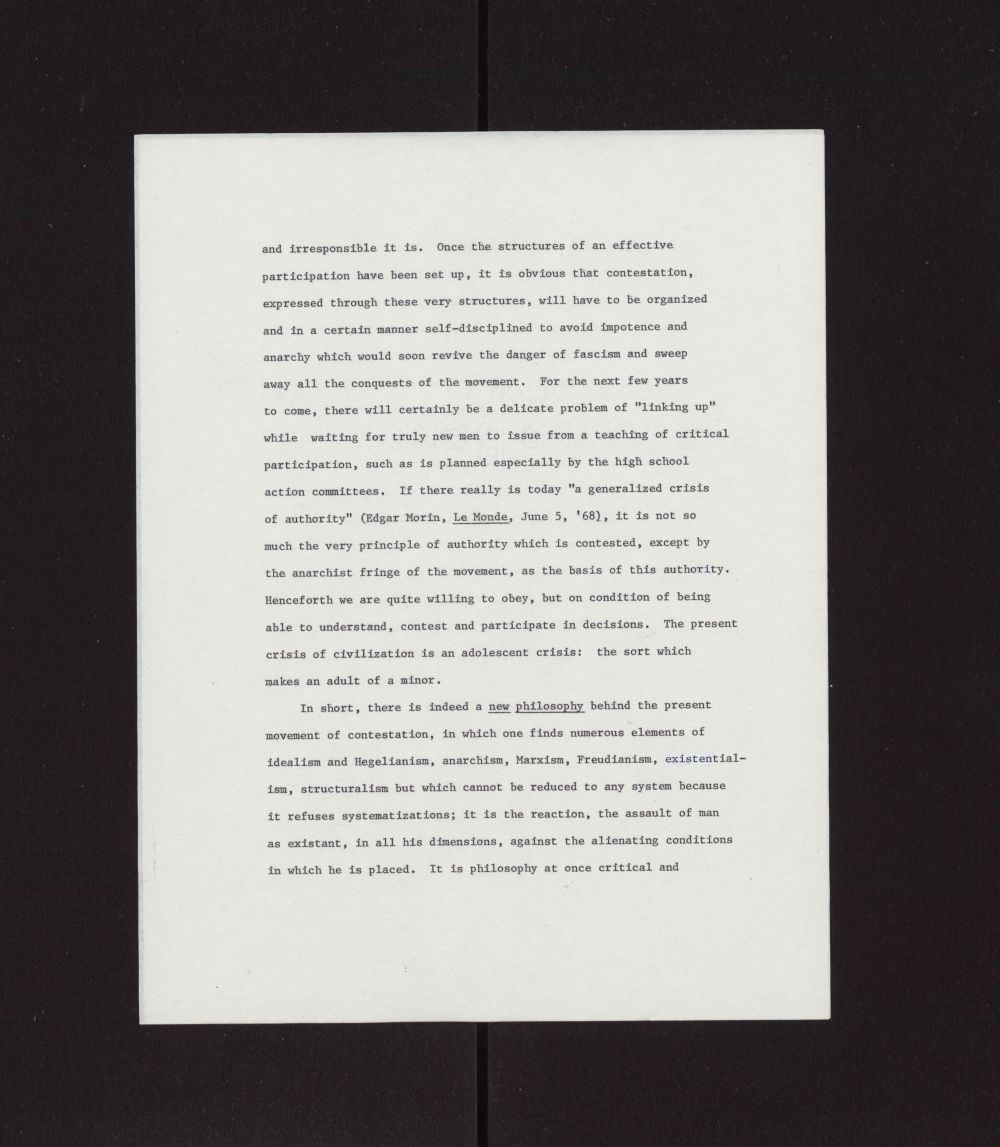

and Irresponsible it ts. Once the structures of an effective
participation have been set up, it is obvious that contestation,
expressed through these very' structures, will have to be organized
and in a certain manner self—disciplined to avoid impotence a.nd
anarchy which would soon revive the danger of fascism and
participation have been set up, it is obvious that contestation,
expressed through these very' structures, will have to be organized
and in a certain manner self—disciplined to avoid impotence a.nd
anarchy which would soon revive the danger of fascism and
all the conquests of the movement. For the next few years
to come, there will certainly be a delicate problem of "linking up"
while waiting for truly new to issue from a teaching of critical
participation, such as is planned especially fey the high school
action committees. If there really is today "a generalized crisis
of authority" (Edgar Morin, Ji§_^£H§e,> June 5, *68), it is not so
much the very principle of authority which is contested, except by
the anarchist fringe of the movement, as the basis of this authority.
Henceforth we are quite willing to obey, but on condition of being
able to understand, contest and participate In decisions. The present
crisis of civilization is an adolescent crisis: the sort which
makes an adult of a minor.
to come, there will certainly be a delicate problem of "linking up"
while waiting for truly new to issue from a teaching of critical
participation, such as is planned especially fey the high school
action committees. If there really is today "a generalized crisis
of authority" (Edgar Morin, Ji§_^£H§e,> June 5, *68), it is not so
much the very principle of authority which is contested, except by
the anarchist fringe of the movement, as the basis of this authority.
Henceforth we are quite willing to obey, but on condition of being
able to understand, contest and participate In decisions. The present
crisis of civilization is an adolescent crisis: the sort which
makes an adult of a minor.
In short, there is indeed a new philosophy behind the present
movement of contestation, in which one finds numerous elements of
Idealism and Hegellanlsm, anarchism, Marxism, Freudlanism, existential-
ism, structuralism but which cannot be reduced to any system because
it refuses systematizatlons; It is the reaction, the assault of man
as existant, in all his dimensions, against the alienating conditions
In which he is placed. It is philosophy at once critical and
movement of contestation, in which one finds numerous elements of
Idealism and Hegellanlsm, anarchism, Marxism, Freudlanism, existential-
ism, structuralism but which cannot be reduced to any system because
it refuses systematizatlons; It is the reaction, the assault of man
as existant, in all his dimensions, against the alienating conditions
In which he is placed. It is philosophy at once critical and
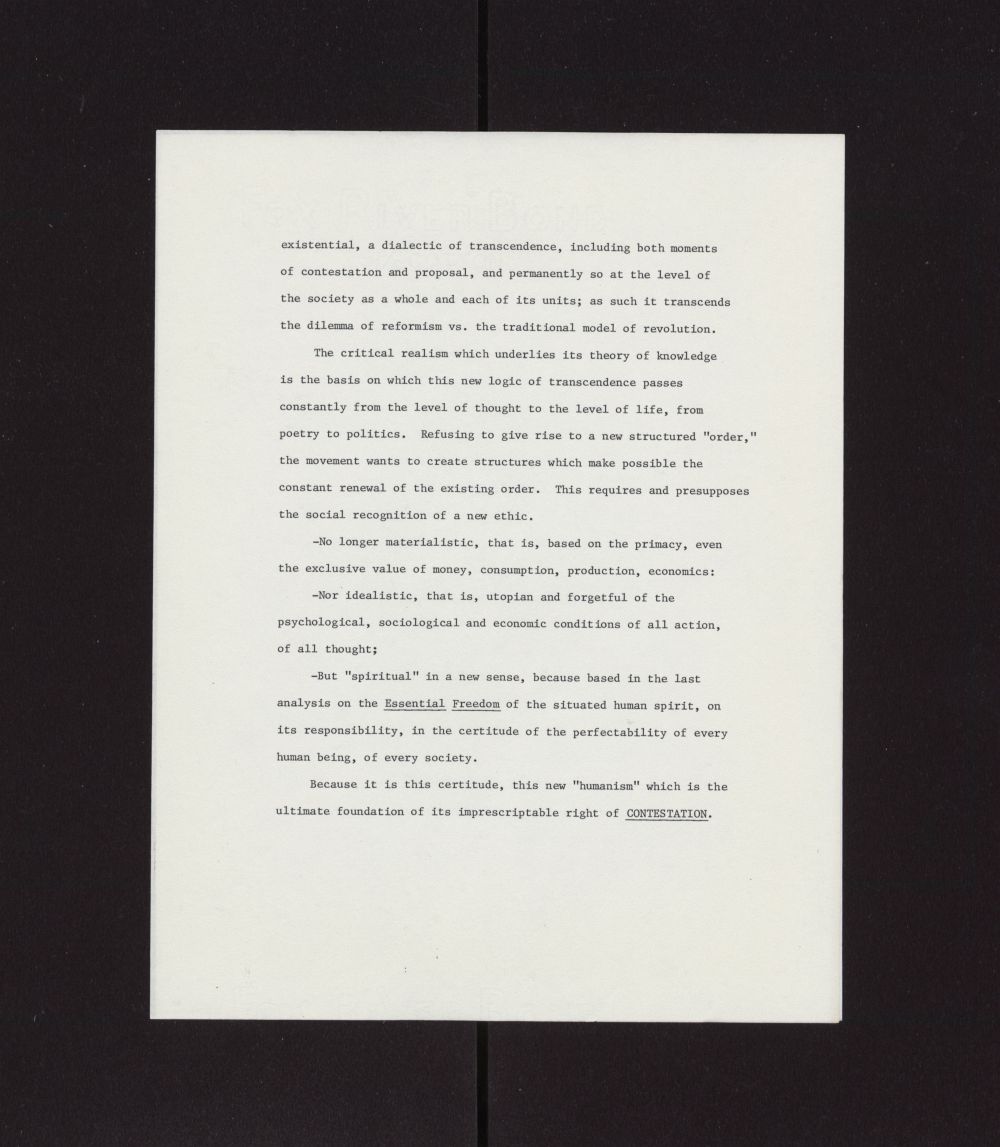

existential, a dialectic of transcendence, including both moments
of contestation and proposal, and permanently so at the level of
the society as a whole and each of its units; as such It transcends
the dilemma of reformism vs. the traditional model of revolution.
of contestation and proposal, and permanently so at the level of
the society as a whole and each of its units; as such It transcends
the dilemma of reformism vs. the traditional model of revolution.
The critical realism which underlies its theory of knowledge
Is the basis on which this new logic of transcendence passes
constantly from the level of thought to the level of life, from
poetry to politics. Refusing to give rise to a new structured "order,"
the movement wants to create structures which make possible the
constant renewal of the existing order. This requires and presupposes
the social recognition of a new ethic.
Is the basis on which this new logic of transcendence passes
constantly from the level of thought to the level of life, from
poetry to politics. Refusing to give rise to a new structured "order,"
the movement wants to create structures which make possible the
constant renewal of the existing order. This requires and presupposes
the social recognition of a new ethic.
-No longer materialistic, that is, based on the primacy, even
the exclusive value of money, consumption, production, economics:
the exclusive value of money, consumption, production, economics:
-Nor idealistic, that Is, Utopian and forgetful of the
psychological, sociological and economic conditions of all action,
of all thought;
psychological, sociological and economic conditions of all action,
of all thought;
-But "spiritual" in a new sense, because based in the last
analysis on the Es_sentlal Freedom of the situated human spirit, on
Its responsibility, in the certitude of the perfectability of every
human being, of every society.
analysis on the Es_sentlal Freedom of the situated human spirit, on
Its responsibility, in the certitude of the perfectability of every
human being, of every society.
Because it is this certitude, this new "humanism" which Is the
ultimate foundation of its imprescriptible right of CONTESTATION.
ultimate foundation of its imprescriptible right of CONTESTATION.
Category
Title
Critical University
Date
06/1968
Translation of
Keywords